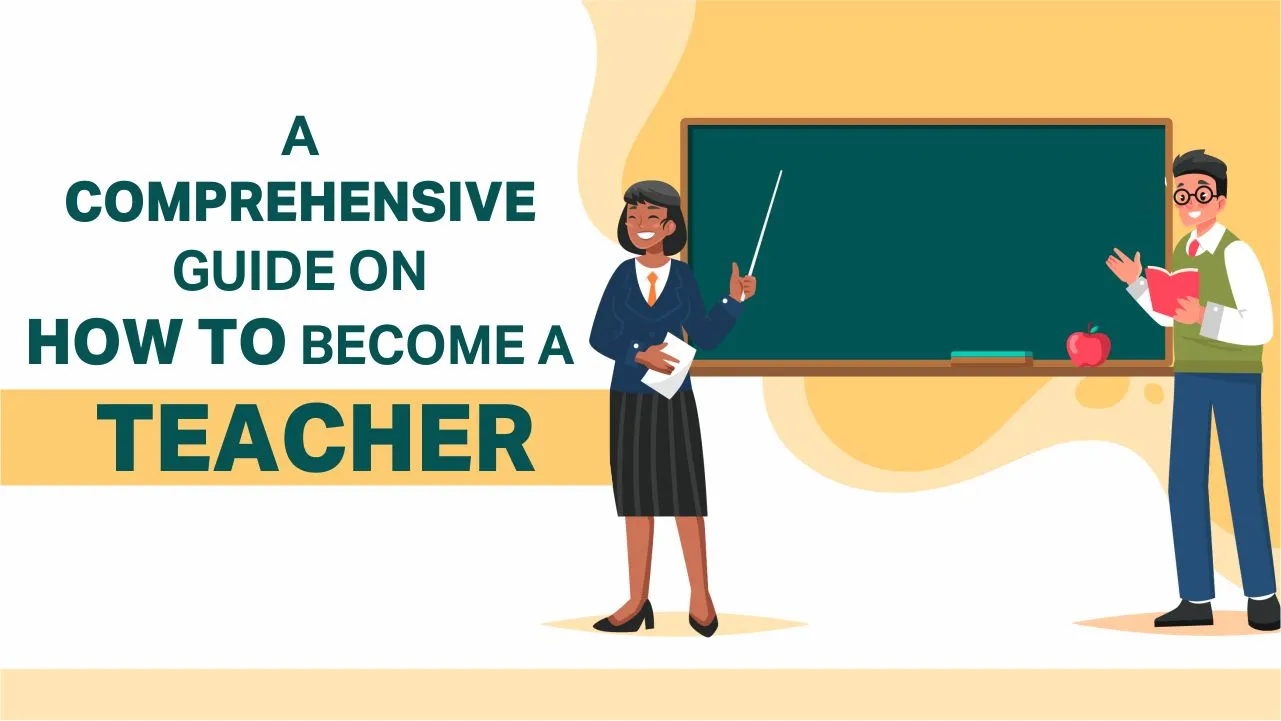
A Comprehensive Guide on How to Become a Teacher
A favorite childhood teacher may have taught us how to read, how to value diversity, or even how to play cricket. It could be the inspiration for you to become a teacher yourself.
Becoming a teacher is a noble profession that allows individuals to make a profound impact on the lives of others. If you have a passion and interest in education, becoming a teacher might be the right path for you. Are you interested in becoming a teacher yourself?
In this article we will discuss how to become a teacher, what is the degree for a teacher, and what exams you need to pass. The path to becoming a teacher may begin with a bachelor’s degree, but it does not end there.
How to Become a Government Teacher
Becoming a government teacher can be a fulfilling career choice. It offers job security, attractive benefits, and the opportunities in education field. Here are some essential steps to becoming a government teacher:
- Earn a Bachelor’s Degree: The first step is to complete a bachelor’s degree in education (B.Ed.) or a subject-specific bachelor’s degree with an additional B.Ed. qualification.
- Qualify Teacher Eligibility Test (TET): Most government teaching positions require candidates to pass the Teacher Eligibility Test (TET). This test assesses the candidate’s knowledge and teaching skills.
- Pursue a Master’s Degree (Optional): While not mandatory for all positions, a master’s degree in education or a subject-related field. However, it can enhance your career prospects with a deeper understanding of educational theories and practices.
- Gain Teaching Experience: To become a government teacher, gaining teaching experience through internships or volunteering can be beneficial. It helps in developing teaching skills and adds credibility to your resume.
- Clear Competitive Examinations: Government teaching positions often involve clearing competitive examinations. The exams are the State Level Eligibility Test (SLET) or the National Eligibility Test (NET) to qualify for higher education positions.
- Apply for Government Teaching Jobs: Once you have met the necessary qualifications to become a teacher, you can apply for government teaching positions.
Degree for Teachers
Obtaining the appropriate degree is crucial for aspiring teachers. The most common degree for teachers is a Bachelor of Education (B.Ed.), which equips individuals with the necessary pedagogical skills and knowledge. Here’s what you need to know about pursuing a degree in teaching:
- Bachelor of Education (B.Ed.): A B.Ed. degree is typically a one- or two-year program that prepares individuals for a career in teaching. It covers subjects such as educational psychology, teaching methodologies, curriculum planning, and classroom management.
- Subject-Specific Degrees: In addition to a B.Ed., some teaching positions require a subject-specific degree. For instance, to become a high school math teacher, one should have a bachelor’s degree in mathematics or a related field, followed by a B.Ed.
- Master’s Degree in Education: Pursuing a master’s degree in education can provide advanced knowledge and specialization in various areas of teaching. It can be beneficial for career advancement and pursuing leadership roles in education.
- Continuing Education: Teachers are encouraged to engage in continuous professional development. Workshops, seminars, and further education programs keep you updated with the latest teaching methodologies and pedagogical advancements.
Types of Teachers
Teaching is a diverse profession with various specializations and roles. Here are some of the different types of teachers you can aspire to become:
- Elementary School Teacher: Elementary school teachers work with children in grades K-5. They mainly focus on foundational subjects such as math, science, language arts, and social studies.
- Secondary School Teacher: Secondary school teachers specialize in teaching subjects. These subjects are mathematics, English, history, science, and foreign languages for students in grades 6-12.
- Special Education Teacher: Special education teachers work with students who have disabilities or special learning needs.
- Early Childhood Educator: Early childhood educators work with young children, typically aged 3-5, providing them with a solid foundation in learning and development through play-based activities.
- Higher Education Professor: Higher education professors teach at colleges and universities. They specialise in specific academic disciplines and conduct research in their field of expertise.
Qualifications to Become a Teacher
To become a teacher, certain qualifications are necessary to ensure you have the knowledge and skills required to excel in the classroom. Here are some essential qualifications:
- Patience and Empathy: Teachers should possess patience and empathy to effectively work with students of varying abilities and backgrounds.
- Communication Skills: Effective communication is vital for teachers to convey information. It engages students and builds positive relationships.
- Organizational Skills: Teachers must have strong organizational skills to plan lessons, manage time, and maintain records effectively.
- Adaptability: Being adaptable allows teachers to adjust their teaching strategies. It is based on student needs and changing circumstances.
- Subject Knowledge: Depending on the teaching specialization, having a strong foundation in the subject matter is crucial for effective instruction.
Conclusion
Becoming a teacher can be a rewarding and fulfilling career choice. If you are aspiring to become a government teacher or pursue teaching in other sectors, acquiring the necessary qualifications and required degree for a teacher is essential.
This comprehensive guide has provided valuable insights into the process of becoming a teacher. It includes the steps to become a government teacher and the required degrees. Also, the different types of teachers, and the qualifications needed for a successful teaching career.
By following these guidelines and continuously striving for professional growth, one can embark on a journey that positively impacts the lives of countless students.
Also Read: Training the future educators at the Best B.Ed College in Gurgaon
Recent Post
